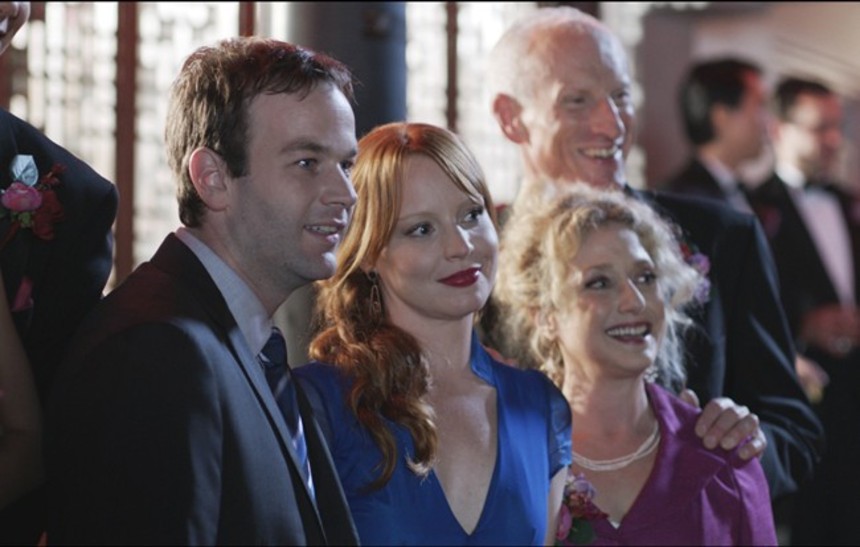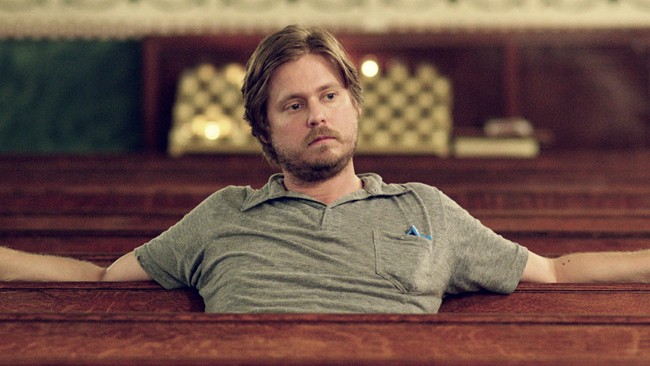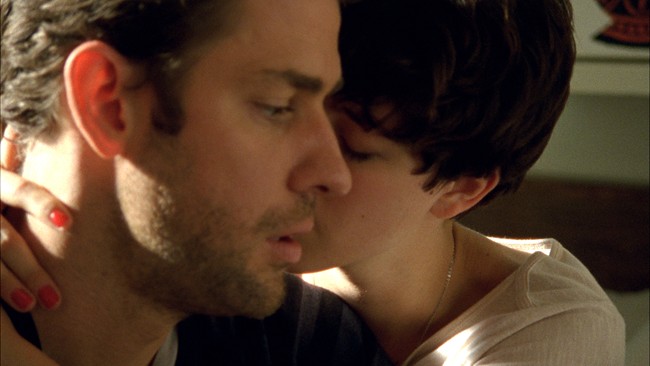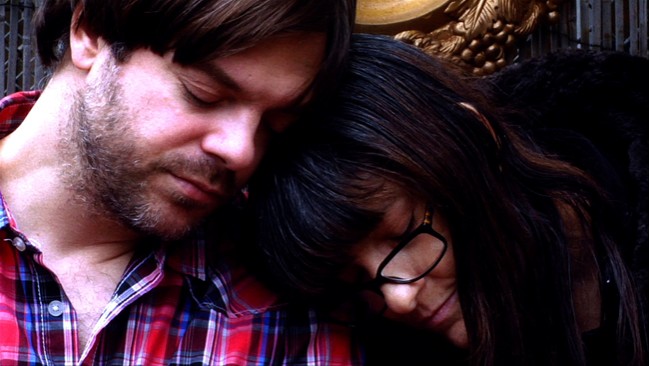BAMcinemaFest 2012 Preview

BAMcinemaFest, the BAMcinématek at Brooklyn Academy of Music's annual survey of new American independent cinema, returns for its fourth year from June 20 through July 1, this time with a distinctly New York and Brooklyn-centric slant. The festival's typically eclectic lineup includes new narrative features from such celebrated filmmakers as So Yong Kim (For Ellen), Ry Russo-Young (Nobody Walks), as well as the latest documentary by Jesus Camp directors Heidi Ewing and Rachel Grady (Detropia), and a preview of Benh Zeitlin's Sundance and Cannes prize-winning film Beasts of the Southern Wild. There are also retrospective screenings of Roberto Rossellini's digitally restored 1952 film The Machine that Kills Bad People, Frank Tashlin's 1964 Jerry Lewis vehicle The Disorderly Orderly, and Noah Baumbach's 1995 debut Kicking and Screaming. Add to that live music, outdoor screenings, after-parties, and free beer, and you have the makings of a rewarding 11 days at the movies. Below are brief reviews of some of this year's fest selections.
Sleepwalk With Me (Mike Birbiglia)
Mike Birbiglia's adaptation of his own one-man show, the opening night film of BAMcinemaFEST, sources its humor in its hilariously brutal honesty about the far from glamorous life of a working comedian, as well as the complicated entanglements of romantic relationships, and how easily people can become trapped in relationships that have gone long past their sell-by dates. Birbiglia plays Matt Pandamiglio, a thinly fictionalized version of himself, a bartender struggling to make a living as a comedian, doing short sets at the bar where he works, and eventually beginning his full-time comedy career with thankless gigs performing in front of drunk college students and bar patrons. Birbiglia addresses the camera frequently throughout, looking back on events from his life, and especially, as indicated by the title, how he developed his sleepwalking disorder, more precisely known as REM sleep behavior disorder, in which sufferers interact physically with their dream environments, putting them into very dangerous situations where they can often hurt themselves. Birbiglia's film has a breezy conversational style that is quite charming, but not without more poignant moments. He also benefits from an excellent supporting cast, including Lauren Ambrose as his girlfriend/fiancé Abby, and James Rebhorn and Carol Kane as his parents.

Welcome to Pine Hill (Keith Miller)
Miller's film elides the distinction between fiction and documentary, gaining its richness by combining the best qualities of both modes of filmmaking. Based on an actual encounter the director with its star Shannon Harper, which was an argument over a lost dog that expanded into a debate over their very different backgrounds, concerning race and class (Miller is white; Harper is black). Miller turned the encounter into a short film starring them both, which became the basis of this feature. Welcome to Pine Hill is built around the weighty and compelling presence of its lead actor, a newcomer playing a character based on himself. Harper plays Abu, a former drug dealer who tries to remain on the straight and narrow after having spent some time in prison. He is an insurance claims adjuster by day and a bar bouncer by night, who remains surrounded by people who are still in the criminal life. However, his world is upended when he receives very bad news concerning his health. This forces him to reorder his priorities, get his affairs in order, settle his debts, reconnect with his estranged mother, and most importantly, escape the urban jungle that constrains and defines him. Miller's understated yet mesmerizing style of filmmaking puts Harper's remarkable performance in sharp relief, assisting Harper greatly in transforming what in other hands is too often a stereotypical character into a complex and multilayered one, culminating in a quietly but intensely heartrending denouement.

Compliance (Craig Zobel)
Craig Zobel's latest film Compliance seems to have an outlandishly bizarre and unbelievable premise, yet we are assured with an opening title that it is inspired by true events. Similarly to his previous feature Great World of Sound, Compliance is based around a grand con, one which manipulates people's willingness to acquiesce to those who are, or claim to be, in positions of power and authority. In this film, this tendency leads to rather extreme acts of humiliation and violations of dignity and humanity visited on the young woman at the center of the story. Behind the near-exploitative and controversy-baiting elements of the scenario lies the film's real subject: the current precarious state of the economy, especially the impact it has on those who work in the low-paying service sectors of the workforce. This precariousness compels those especially vulnerable, living paycheck to paycheck, to hold on to whatever crappy job that stands between them and utter destitution for dear life. The indignities and human rights violations perpetrated in the film are an extreme version of the wage slavery suffered by so many people in our society.
While these ideas are certainly worthy of examination, Zobel's approach is one I find dubious, one which tries to have its cake and eat it too by trying to maintain an outraged stance against the exploitation depicted while at the same time visually indulging in the results of this exploitation. Compliance ultimately ends up as a Michael Haneke-lite attempt to voyeuristically implicate the viewer that Zobel doesn't quite have the skill to successfully pull off.

The Comedy (Rick Alverson)
The title of Alverson's film is quite accurate, but not quite in the way one would assume. While there are in fact some very funny scenes in the traditionally humorous sense, our laughter is complicated, and in some cases dies in our throat, when a subsequent scene pulls us up short and forces us to confront the darker implications of the character behavior on display. The brand of comedy Alverson practices here ends up as something closer to the Balzacian sense of the human comedy, a penetrating and sometimes disturbing examination of the foibles and follies inherent in human behavior. In this case, these concerns are viewed through the lens of a particularly caustic critique of a privileged class, whose idleness and boredom, leads them to deal with the world around them with self-indulgent bemusement and casual cruelty.
Swanson, The Comedy's protagonist - played by Tim Heidecker (of the cult show Tim & Eric Awesome Show, Great Job!) with chilling, deadpan perfection - is about to inherit his dying father's estate, and is presumably set for life and wants for nothing. While we get little backstory into his past, we can probably infer that his upbringing has insulated him from normal life concerns and cares, making him an aimless person, seemingly lacking any sort of moral compass. He whiles his days away, hanging out in the Brooklyn neighborhoods of Williamsburg and Greenpoint on an endless vacation in the company of likeminded compatriots. The companions are played here by actors that provide Heidecker with great supporting characters, and include Tim & Eric co-star Eric Wareheim and LCD Soundsystem frontman James Murphy. They indulge in such activities as playing frat-party games well past the normal age of doing this, interrupting church worshipers with childish antics, and obnoxiously taunting cab drivers. Swanson, however, does his most extreme acts on his own, such as verbally abusing the male nurse who takes care of his father, coming dangerously close to crossing racial lines with a group of tough-looking black guys, and bribing and cajoling a cab driver into letting him drive the cab himself. At one point Swanson takes a job as a restaurant dishwasher ("How old are you?" his interviewer asks incredulously), and one scene in which he lures a female coworker onto his boat reveals in a stark way how completely divorced Swanson has become from any sort of normal human empathy.
Alverson renders all this with a visual style that is bracingly naturalistic and documentary-like, fully immersing us in Swanson and his friend's interactions with the world around them. The Comedy is a boldly original and complex work that is a major highlight of this year's fest selections.

Nobody Walks (Ry Russo-Young)
Director Ry Russo-Young (You Won't Miss Me) makes a major leap in complexity and penetrating character study with her third feature Nobody Walks, co-written with Lena Dunham (Tiny Furniture, Girls), which tells its story from multiple perspectives, and features both beautiful photography and equally beautiful performances. This is my personal favorite out of all of the festival films I was able to preview. It observes and draws us into the intricate entanglements and crises of its many characters without imposing judgment on their often ill-advised and hurtful actions, a delicate balancing act that Russo-Young pulls off flawlessly.
Nobody Walks is built on a variation of the Teorema scenario, in which the arrival of an outsider upsets the balance of a family and exposes emotional fault lines that threaten to shatter relationships irreversibly. Martine (Olivia Thirlby) is an artist from New York who travels to Los Angeles to work on her installation art film, who stays with Julie (Rosemarie DeWitt), a friend of a friend, her husband Peter (John Krasinski), and their children, one of which is Julie's teenager's daughter Kolt (India Ennenga). Martine works closely with Peter, a film sound man, on the sound design of her film, and it isn't long before their working relationship crosses the line from a professional one to a sexual one. Peter's assistant David (Rhys Wakefield) is also interested in Martine, and he is also the object of Kolt's crush. Julie is a therapist who is continually and openly propositioned by Billy (Justin Kirk), a screenwriter and one of her patients.
All this drama plays itself out against the sun-drenched iconic backdrops of Los Angeles, filmed in richly textured Super-16 by cinematographer Christopher Blauvelt, so it is very much anchored in that particular environment. However, there is a distinctly European feel to Russo-Young and Dunham's approach to these characters and their situations, especially the knotted webs of romantic entanglements and hookups that occur, which reminded me of many French films. Combine this with beautifully rendered and nuanced performance across the board, especially from Thirlby, DeWitt, Krasinski, and a great turn by newcomer Ennenga, and you have one of the year's best American films.

Walk Away Renee (Jonathan Caouette)
This is Caouette's long-awaited follow-up to Tarnation, his revelatory 2003 documentary/home movie/psychodrama concerning his troubled family life, assembled from hundreds of hours of his own footage where he filmed himself and his family, and famously put together with iMovie on a budget of next to nothing. His latest personal documentary focuses squarely on his mother Renee, who has had a long history of mental illness exacerbated by permanent brain damage cause by a lithium overdose. Caouette now has a settled life with his boyfriend and young son, but her mother's problems and demons are still a source of strife and trouble. The film becomes a sort of road movie, in which Caouette moves his mother from the medical facility where she has been living in Houston to another one closer to where he lives in New York. Renee's medication goes missing at one point, which causes a major crisis, with Caouette begging administrators to bend their unyielding bureaucracy so that his mother can have the medicine that is the only thing keeping her stable. Walk Away Renee takes many detours on its trip, making use of the style of Tarnation, with its kaleidoscopic use of home movie footage, explanatory titles, and poignant song selections. He also introduces a sense of the cosmic to this, inserting some trippy fantasy imagery involving theories of parallel universes proposed by physicist Michio Kaku, who makes a guest appearance via TV interview. However, the results here are less revelatory than his debut film, and much of it feels like a rehash of that earlier film, and what was an artful visual bouillabaisse in Tarnation comes across here as messy and unfocused. Still, Caouette's talent remains undeniable, and the latter passages end the film on an emotionally moving note.

Francine (Melanie Shatzky and Brian M. Cassidy)
Documentary filmmakers Shatzky and Cassidy's fiction debut Francine centers on the quietly intense performance by Melissa Leo (Frozen River, The Fighter) as the title character, a withdrawn woman just released from prison who battles an uphill struggle to adjust to life on the outside. Remarkably, Francine combines often uncomfortably close intimacy with a mysterious opaqueness and inscrutability concerning its protagonist who we never really get to know yet have sympathy for. Francine is a woman in isolation wherever she goes, whether on the few jobs we observe her working, or doing such recreational activities as attending an outdoor metal concert or going to a roller rink. The only living creatures she can relate to are not other humans, but animals, which is where she places all her feelings of love, affection, and fierce protectiveness. The animal menagerie in her home steadily increases, along with the attendant deterioration of housekeeping, reflecting a probable mental unraveling. The Dardenne brothers have rightly been cited as a possible influence, but Shatzky and Cassidy have their own unique style, which situates its character fully within its vivid depiction of depressed rural environments, and elicits sympathy without resorting to sentimentality or manipulative dramatics.
For more information on these and other festival films, and to purchase tickets, visit BAM's website.

Do you feel this content is inappropriate or infringes upon your rights? Click here to report it, or see our DMCA policy.






